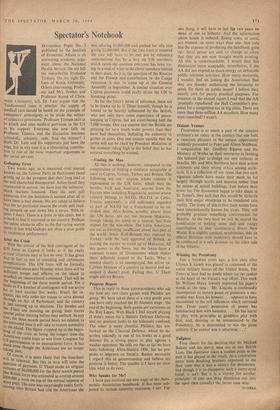After the Crisis
With the arrival of the first contingent of the UN force in Cyprus it looks as if the really critical situation may at last be over. It has given Way in fact to one of unending and unforeseen complications. The UN force will be formally constituted about next Monday when there will be sufficient troops and officers on the island to establish an international command. That will be the beginning of the three month period. Yet it looks as if a number of contingents will not arrive for at least another five weeks. Brazil, far in- stance, can only order her troops to serve abroad through an Act of Parliament, and the country ls_ just coming up to elections. The Swedes and the Finns are insisting on giving their forces special police training before they embark. In any case, the three month period bears no relation to the estimated time it will take to restore normality to the island. The figure cropped up at the begin- ning of the crisis as being the longest time the Americans could hope to win from Congress for unsi
participation in an international force. It has stuck even though the Americans are no longer taking part.
Of Course, it is quite likely that the time-limit will be renewed. But this in turn will raise the question of payment. U Thant made an original estimate of $6,000,000 for the three month period (the British force was estimated as costing around £400,000 a week on top of the normal expense of atttty pay). The sum was surprisingly easily forth- coming once Britain bad told the Americans she
was offering $1,000,000 and pushed her ally into giving 52,000,000. But if the time limit is renewed the cost will have to be met not by voluntary contributions but by a levy on UN members, which raises the question everyone has been try- ing to avoid of what to do about members behind in their dues. As it is, the question of the Russian and the French non-contribution to the Congo operation is due to come up at the General Assembly in September. A similar situation over Cyprus payments could really strain the UN to breaking point.
As for the force's terms of reference, these are to be drawn up by U Thant himself, though he is bound to be heavily influenced by the British, who not only have some experience of peace- keeping in Cyprus, but are contributing half the 7,000 troops. One can assume that the British are pressing for very much wider powers than they have had themselves, including the authority to gather in arms. One can assume equally that the terms will not be liked by President Makarios at the moment riding high in the belief that he has secured everything he wanted.








































 Previous page
Previous page